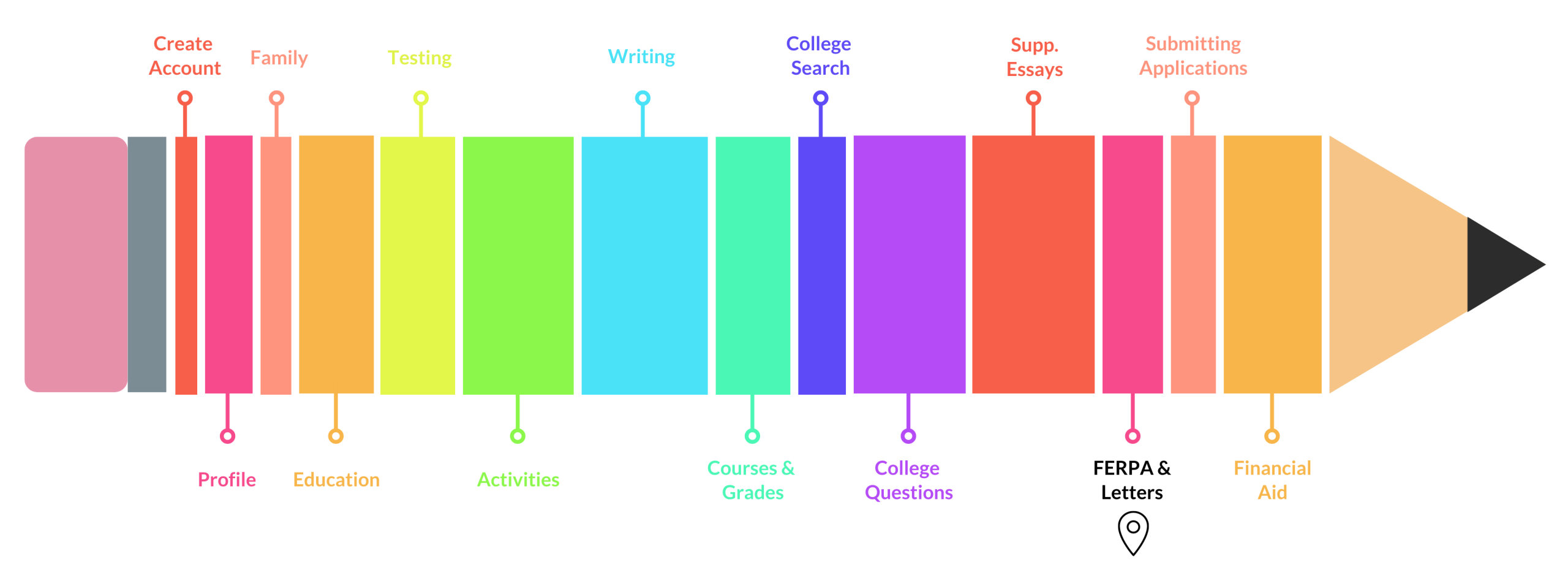Recommenders & FERPA
 The Recommenders & FERPA section should take approximately 10 – 25 minutes.
The Recommenders & FERPA section should take approximately 10 – 25 minutes.
Items marked with a red asterisk * are required. Students are not required to complete items that do not have the red asterisk.
Introduction
In the Recommenders & FERPA section, you will:
- Understand the FERPA waiver and decide whether to waive your FERPA rights
- Understand the role of Letters of Recommendation in admissions
Your school might have specific procedures for inviting recommenders. Ask your high school counselor if your school has a special procedure for requesting letters of recommendation.
Videos
In this video, we discuss the FERPA waiver. FERPA is the Family Educational Rights and Privacy Act. This FERPA form must be completed before you can access the Letters of Recommendation section of Common App. The purpose of this video is to explain the purpose of the FERPA Release and your options in completing this form. This video should take approximately 3 minutes.
In this video, we discuss the Letters of Recommendation. Different high schools have different procedures for sending letters of recommendation to colleges. The purpose of this video is to help you learn if a college requires letters of recommendation, how many to send, and which teachers to ask. Finally, we provide tips for how to ask your teacher for letters of recommendation. This video should take approximately 5 minutes.
Tips & Reminders
- If you “waive your right to review all recommendations and supporting documents,” it means that your teacher’s letter of recommendation will remain a private letter of communication to the college. You will not know what the recommender said about you.
- Although it is ultimately your decision, many professional counselors suggest that students waive their right to review recommendations and supporting documents.
- Some colleges do not require or accept letters of recommendation from teachers. To find out if a college requires or accepts letters of recommendation, go to the My Colleges section of Common App, click on the college name, and scroll down the page to find Recommendations.
- Different high schools use different electronic platforms to submit letters of recommendation to the colleges. Your high school might not use Common App to send recommendations to colleges. Ask your high school counselor how your school handles letters of recommendation.
- Your school might have specific procedures for inviting recommenders. Ask your high school counselor if your school has a special procedure for requesting letters of recommendation.
- Sometimes teachers or school counselors will ask students to create a “brag sheet,” which is a document with information about the student that the teacher or counselor can use to write a letter of recommendation.
- The Recommenders section of Common App allows you to invite an Advisor. An “Advisor” is a person with whom you can share your application to get their feedback. It can be a parent, a friend, a community-based organization, or a college counselor. You are not required to invite an Advisor. If you do invite an Advisor, they will be able to see your application, but will be unable to edit it. Colleges cannot see the names of any advisors, and advisors are not known to each other or to the school counselor.
- Many colleges also accept recommendations from “other” recommenders, which can include an employer, a coach, or another person who knows you well and can speak to your accomplishments or character. Each college where you will apply states how many letters of recommendation they require. Be sure to go through these requirements and identify the people who will provide the letters of recommendation. Some high schools use Common App to manage their recommendation process while other high schools use different platforms such as SCOIR, Parchment, or Naviance.
FERPA is the Family Educational Rights and Privacy Act. Before you can access the section of Common App related to Letters of Recommendation, you must complete the FERPA Release Authorization process. Under FERPA, when you ultimately attend a specific college, you have the right to read your application to that college, including any letters of recommendation written for you by teachers or others. The Release Authorization is asking whether you want to waive this right. Waiving your FERPA right would mean that once a letter of recommendation is sent to a college, you have no right to view it. That letter of recommendation will remain a private communication between the letter writer and the college.
Many colleges require applicants to submit one or two letters of recommendation from teachers as part of their application. The purpose of the letter is to provide a college or university the opportunity to learn more about you, the type of student you are, and how you contribute in the classroom, school, or community. Many colleges also request a letter of recommendation from your high school counselor. The counselor’s recommendation is used to understand your school and its curriculum and how you as a student fit into the school community. Many colleges also accept recommendations from “other” recommenders, which can include an employer, a coach, or another person who knows you well and can speak to your accomplishments or character. Each college where you will apply states how many letters of recommendation they require. Be sure to go through these requirements and identify the people who will provide the letters of recommendation. Some high schools use Common App to manage their recommendation process while other high schools use different platforms such as SCOIR, Parchment, or Naviance. Talk to your high school counselor to learn how your school handles the recommendation process and be sure to follow that process.



